Abdulla Gadimbayli and Govhar Beydullayeva win FIDE World Junior Championship
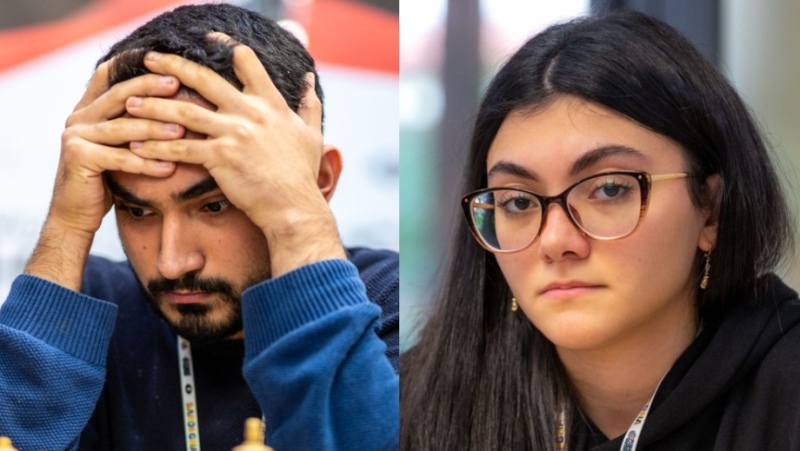
Azerbaijani players rule supreme in the 2022 FIDE World Junior Championship that came to an end in Sardinia. Abdulla Gadimbayli (pictured below) and Govhar Beydullayeva of Azerbaijan took titles in very close competitions in both open and girl sections. The open event was a nail-biter until the very end. Adam Kozak (Hungary) was coming into the final round on 8/10, a half point ahead of Gadimbayli, with as many as nine players trailing the leader by a full point. Abdulla played a very exciting game with his compatriot Mahammad Nuradli that ended in a draw. Francesco Sonis (Italy) and Nikolozi Kacharava (Georgia) scored very important victories and caught up with Gadimbayli. Now all eyes were on the encounter between Leon Luke Mendoza and Adam Kozak (pictured below), in which the Hungarian needed just a draw to clinch the title. However, Adam did not manage to hold an inferior endgame down an exchange playing on a 30-second increment and threw in the towel on the move 83. As a result, five players tied for first place, with Abdulla Gadimbayli claiming gold thanks to slightly better Buchholz (just 0.5 points) over Adam Kozak, who had to settle for silver. The bronze medal goes to Nikolozi Kacharava. Final standings: 1 IM Gadimbayli, Abdulla AZE 2499 8 2 GM Kozak, Adam HUN 2516 8 3 IM Kacharava, Nikolozi GEO 2512 8 4 GM Sonis, Francesco ITA 2531 8 5 GM Mendonca, Leon Luke IND 2558 8 6 GM Esipenko, Andrey FID 2668 7½ 7 GM Nesterov, Arseniy FID 2567 7½ 8 IM Samunenkov, Ihor UKR 2473 7½ 9 GM Petkov, Momchil BUL 2511 7½ 10 IM Davtyan, Artur ARM 2517 7½ Ironically, the leader in the girls section Govhar Beydullayeva (pictured below), also lost her final round game, but it went without consequences as she had a full-point cushion and better tiebreaks (direct encounter win) over her main rival Assel Serikbay from Kazakhstan. Assel did her best, beat Yelyzaveta Hrebenshchykova (Ukraine) and scored equal points with Beydullayeva, but it was only enough for silver. Four players tied for third place, but Meruet Kamalidenova (Kazakhstan) pulled out bronze thanks largely to her last-round victory over the champion. Final standings: 1 WGM Beydullayeva, Govhar AZE 2356 8½ 2 WIM Serikbay, Assel KAZ 2181 8½ 3 WIM Kamalidenova, Meruert KAZ 2376 8 4 WIM Urh, Zala SLO 2221 8 5 FM Jarocka, Liwia POL 2089 8 6 FM Kurmangaliyeva, Liya KAZ 2199 8 7 FM Schulze, Lara GER 2266 7½ 8 IM Salimova, Nurgyul BUL 2415 7 9 Hrebenshchykova, Yelyzaveta UKR 2268 7 10 WFM Hajiyeva, Laman AZE 2138 7 Photo: Przemek Nikiel Official website: fideworldjunior2022.com
2022 FIDE World Amateur Championships kicks off in Malta
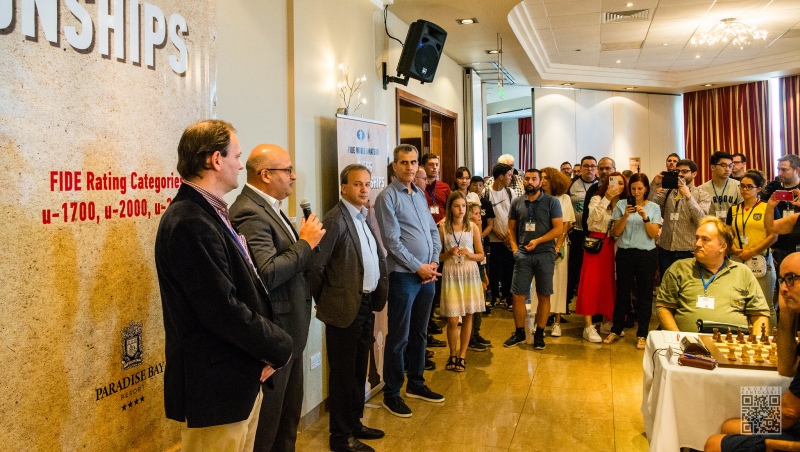
The 2022 FIDE World Amateur Championships took off at the 4-star Conference Hotel “Paradise Bay Resort” in Malta. Running from October 20-30, the event brought together 197 players from 51 federations, including 27 title-holders. FIDE President Arkady Dvorkovich kicked off the championship with the ceremonial first move 1.e4. The event is held over four sections: U 2300, U 2000, U 1700 and Women U1700. Women playing in the open sections U 2300 and U 2000 will be eligible to win prizes from both categories. All the competitions are 9-round Swiss tournaments with classical time control. The final ranking order of the players is determined by the number of points scored. If at the end of the tournament, two or more players are tied for first place or any prize, the tie will be broken in accordance with the following criteria: 1. Results of direct encounters between the tied players (applies only if all tied players have played each other). 2. Buccholz Cut 1 3. Buccholz 4. The greater number of games played with black 5. The greater number of wins Photo: Andreas Kontokanis
Jan-Krzysztof Duda reigns supreme in Aimchess Rapid
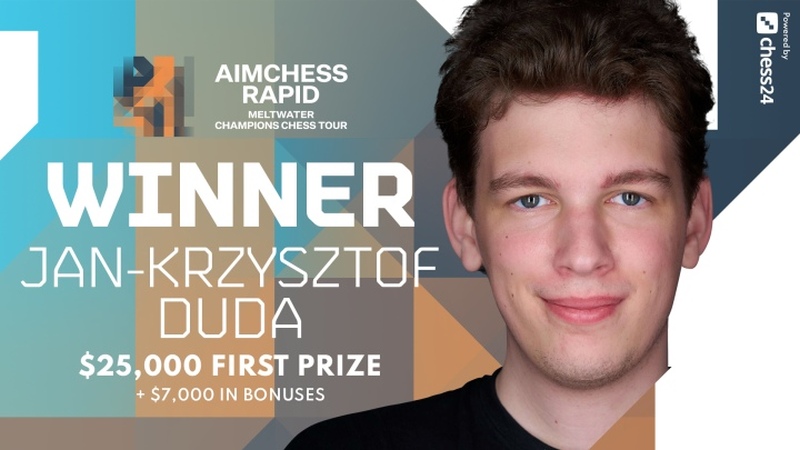
Jan-Krzysztof Duda fended off a fierce comeback from Shakhriyar Mamedyarov to win the £150,000 Aimchess Rapid, his second Meltwater Champions Chess Tour title this season. Poland’s reigning World Cup winner came into today’s second day of the final needing just a draw to secure the tournament after a 3-1 first-match win. But Mamedyarov roared back to take the first two games of the second rubber. When Duda made the shock decision to take a quick draw in the third, perhaps to regroup, Mamedyarov was level and the match headed to tiebreaks. It seemed a questionable decision from Duda, but it worked as the 24-year-old Pole took the first blitz tiebreaker and then Mamedyarov blundered in the second to make it game, set and match. Duda was typically hard on himself afterwards, despite the win. “I’m extremely happy and joyful that I’ve managed to win the tournament,” he said. “But today’s performance was very, very bad I think and I would like actually to forget about the games I played in rapid…” The result was fully deserved for Duda. He topped the leaderboard in the all-play-all prelim stage and then knocked out Tour Champion Magnus Carlsen in the semis. Duda then outplayed the in-form Mamedyarov, who had a brilliant tournament himself. Grandmaster David Howell said Duda was simply the best player in the event: “He showed it in the prelims, he started fast, he kept it up every day and despite the dips which are inevitable in any player’s tournaments, he finished on a bang as well. Those blitz games, despite what he says, were very impressive.” Shakh’s explosive comeback started with a bang in Game 1 but sadly ended in a blunder in the blitz tiebreak. Under huge pressure in the first game, Shakh gave up his queen for a rook with 22…Bxc4. Duda was streets ahead according to the computer, but the Azerbaijani had set him problems down the line. Shakh, playing from Baku in Azerbaijan, found one last card to play and launched an imaginative rook attack that crashed though to set up a win. Duda resigned after 34…Be1+. The second game was even more thrilling. Shakh sacrificed a knight to blow Duda’s defence wide open with 13. Nxe6. Shakh castled to get his king to safety and then, with Duda’s king still stuck in the centre, swung his queen over to open a new angle of attack with the killer 18. Qh3. Duda’s defenses collapsed. Shakh had won two games in a row and now needed just a draw to level the score in matches and take the final to tiebreaks. Everything rested on the final game but Duda shocked everyone. Rather than try to win two games on demand, Duda decided to force a draw with a well-known quick 14-move drawing line in the Italian Opening. Both players headed straight to the blitz playoff. If Duda did it to get off his tilt, it worked. The first blitz tiebreak was over in 20 moves as Shakh went for a trick with the double-attack 19. Be8, but it backfired as Duda played the calm 19… Bg6 attacking three pieces at once. Shakh threw in the towel and resigned. The Azerbaijani number 1 needed to win the second on demand but blundered badly before Duda found the knockout blow with 32. Rxc4. Duda is now second on the 2022 Meltwater Champions Chess Tour leaderboard going into the final event next month in San Francisco with Magnus Carlsen already having sealed the overall Tour title. Mamedyarov qualifies for that event starting on November 14 along with Carlsen, Arjun Erigaisi, Duda, Praggnanandhaa, Liem Le and two more players.
2022 U.S. Championship: Fabiano Caruana and Jennifer Yu clinch titles

Text: NM Vanessa West GM Fabiano Caruana is the 2022 U.S. Champion, clinching his second title with a draw in the 13th and final round of the tournament against GM Levon Aronian, a first-time competitor in the U.S. Championship. The U.S. Women’s Championship was decided in a playoff between GM Irina Krush and WGM Jennifer Yu. Krush drew a hard-fought game vs. IM Anna Zatonskih. Meanwhile, Yu scored a must-win victory vs. WGM Thalia Cerventes, tying with Krush and getting a rematch for the title. U.S. Championship – Final Standings U.S. Women’s Championship – Standings after Round 13 2022 U.S. Championship GM Fabiano Caruana vs. GM Levon Aronian ½-½ Twelve minutes into the game, the opponents had already played 34 moves into a repetition draw. However, this was not your typical quick GM draw. As Caruana later explained: “Normally I would’ve liked to play, at least a little bit. Of course a draw is a good result in the last round, considering the tournament situation… It’s a big day for Levon, and I thought it would be wrong for me to play this game.” Catch his full post-game interview on our YouTube Channel. Caruana and Aronian drew before the delayed broadcast even began but for an atypical reason. | Photo courtesy of Saint Louis Chess Club, Lennart Ootes GM Ray Robson vs. GM Jeffery Xiong ½-½ Ray Robson fought for the win and his chance at a playoff for the title but lost his advantage when Jeffery Xiong counterattacked on the kingside. Robson pressed with a small edge for over 30 moves, but with 38…f5 Xiong took over the advantage after 39.Bxf5 Qxh4 40.Bxd7 Nxd7. The players fought for 72 moves before drawing. | ½-½, 72 moves Though they drew, Robson and Xiong came ready for a fight and dueled for over five hours. | Photo courtesy of Saint Louis Chess Club, Lennart Ootes GM Dariusz Swiercz vs. GM Christopher Yoo 0-1 The youngest player in the U.S. Championship, Christopher Yoo, finished on a victory, winning a tactical game vs. GM Dariusz Swiercz. Yoo sealed the victory with 33…b4! breaking the pin on his queen with a double attack against the Swiercz’s queen and rook. | 0-1, 33 moves GM Leinier Dominguez vs. GM Sam Shankland ½-½ Though both players were hoping to have a chance to play for the win, Leinier Dominguez vs. Sam Shankland ended in a 10 move draw. Shankland explains his disappointment with this result in his interview after the game: “I’m sorry for how this ended. I’ve been one of the most vocal critics of people making this Qe4-Qd4 draw in the Berlin. I wrote in my Chessable course that anyone who does this more than once with white just shouldn’t be invited to tournaments. I just felt like I owe the world an apology…” GM Elshan Moradiabadi vs. GM Aleksandr Lenderman 0-1 Aleksandr Lenderman finished his tournament on a victory, battling for the upper hand vs. GM Elshan Moradiabadi for 72 moves. The rest of the games ended in draws. 2022 U.S. Women’s Championship WGM Thalia Cervantes vs. WGM Jennifer Yu 0-1 Jennifer Yu won a critical game with the black pieces vs. her closest competitor, Thalia Cervantes. Yu recaptured with 42…cxd4 when she has great pressure on her opponent between her active rooks on kingside outposts and passed d-pawn. After 43.Rc4 d3 44.Ra4 Ne5 45.Rxa5 Ng6, Black’s knight joined the attack, and Yu soon crashed through on the kingside. | 0-1, 57 moves Yu came through in the last round, giving her the opportunity at a rematch vs. Krush for the championship. | Photo courtesy of Saint Louis Chess Club, Crystal Fuller GM Irina Krush vs. IM Anna Zatonskih ½-½ Irina Krush and longtime rival Anna Zatonskih fought a close game to a king vs. king draw. Though Krush pressed her edge with white for a while, Zatonskih consolidated and after 56…Qc5, the players traded into a balanced ending, drawing on move 87. | ½-½, 87 moves Krush will fight for her ninth U.S. Women’s Championship title in the playoff vs. Yu. | Photo courtesy of Saint Louis Chess Club, Lennart Ootes FM Alice Lee vs. WIM Megan Lee 0-1 Megan Lee capped off her tournament with a king attack victory. Megan Lee ripped open Alice Lee’s kingside with 17…Nxg3! and won material to boot after 18.cxd5 (if 18.hxg3 Qh1+ 19.Kf2 Ne4+ 20.Bxe4 fxe4 21.Ne5 Bxe5 22.dxe5 Qf3+ 23.Kg1 Rh1#) 18…Nxf1 19.Bxf1 exd5 | 0-1, 60 moves Megan Lee finishes her tournament with an attacking victory. | Photo courtesy of Saint Louis Chess Club, Crystal Fuller FM Rochelle Wu vs. WGM Sabina Foisor 1-0 Rochelle Wu defeated Sabina Foisor with a clever interference tactic to win material. Wu played 30.Bd6! cutting off the defense of the d2-rook to win the exchange after 30…R2xd6 31.cxd6 Qxd6 Qxf5 | 1-0, 60 moves WGM Tatev Abrahamyan and Sophie Morris-Suzuki also finished their tournaments with victories while Begim Tokhirjonova and Ruiyang Yan drew. With the U.S. Women’s Championship hanging in the balance, the playoff between WGM Jennifer Yu and GM Irina Krush was a thrilling fight between these fierce competitors from start to finish. In the end, Yu won the playoff in an armageddon tiebreak, gaining her second title, and becoming the 2022 U.S. Women’s Champion. Jennifer Yu, our 2022 U.S. Women’s Champion | Photo courtesy of Saint Louis Chess Club, Lennart Ootes U.S. Women’s Championship – Final Standings Playoff Game 1: Jennifer Yu vs. Irina Krush 1-0 In an incredibly close game with both clocks down to mere seconds, the players repeated the position twice. Jennifer Yu paused. Her 13 seconds began to tick away when she declined the repetition draw offer and found the key checkmating idea. Yu played 45.Qf7!, and there’s no way for Black to escape the checkmate threats on g8 and h7. The game finished with 45…Qxf8 46.Qxh7# | 1-0, 46 moves Yu wins the first game to gain the match lead. | Photo courtesy of Saint Louis Chess Club, Lennart Ootes Playoff
Magnus Carlsen wins 2022 Meltwater Champions Tour with event to spare

Magnus Carlsen sealed the overall Meltwater Champions Chess Tour title for the second year running – this time with an event to spare – after storming into the semi-finals of the Aimchess Rapid. Norway’s world number 1, going for a hat-trick of tournament wins in the Tour’s penultimate event, scooped a $50,000 prize on top of his overall winnings so far of $192,500 and the title of 2022 Tour Champion. Going into today’s quarter-finals, Polish ace Jan-Krzysztof Duda was the only player who could catch him yet needed Indian teen Arjun Erigaisi to knock out Carlsen and then to win November’s final Major of the season. The 31-year-old had to work in the opening game of his quarter-final match as Erigaisi played some of his best chess against the champ to go thee pawns up and set up a seemingly easy win. Carlsen, however, never gives up and opened his full box of endgame tricks to claw his way back into the game. Erigaisi wilted under the pressure and after 137 moves Carlsen escaped with a draw. Carlsen, as he so often does, then took advantage of the Indian teen’s ebbing confidence to follow-up with two crushing wins. It ensured Carlsen’s relatively smooth passage into the Aimchess semi-final – where the Tour Champ and Duda will meet – and decided the 2022 Tour Champion. Duda, playing from Krakow, dominated the prelim stage and carried his form into the knockout as he also beat his Indian opponent, Vidit Gujrathi, 2.5-0.5 with a game to spare. Duda said: “I wouldn’t call it easy, I think it was unexpected that I won the match in three games.” With Duda and Carlsen facing off in one semi, the other will be fought by Azerbaijani ace Shakhriyar Mamedyarov and Romania’s number 1 Richard Rapport with both overcoming teenage prodigies. It meant all the teenagers were knocked out of the Aimchess Rapid. Rapport beat Gukesh D who, like Erigaisi, scored a win against Carlsen in the prelim stage. It took Rapport 167 moves to triumph in an epic final game to deny his teenage opponent tiebreaks. Meanwhile, the experienced Mamedyarov knocked out the World Rapid Champion Nordibek Abdusattorov 2.5-0.5. For Gukesh and Abdusattorov their runs to the last eight were hugely-impressive. The semi-finals begin tomorrow at 18:00 CEST. Every move will be streamed live and for free on chess24.com/tour and on chess24’s Twitch and YouTube channels.
Philippines and Mongolia win Intercontinental Championship for Prisoners
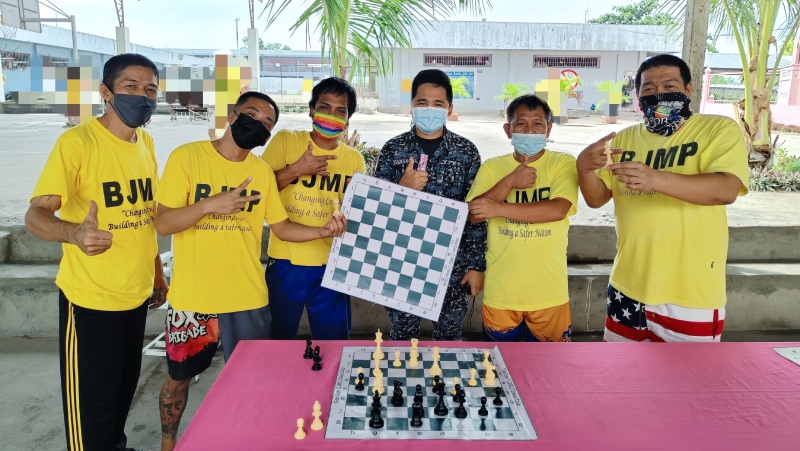
Teams of the Philippines and Mongolia became the champions of the second Intercontinental Online Chess Championship for Prisoners after winning the final of the biggest-ever chess event among correctional facilities. The tournament was organized by FIDE and the Cook County (Chicago, IL, USA) Sheriff’s Office and coincided with the International Day of Education in Prison. The men’s section saw two matches: Colombia and the Philippines fought for gold, while El Salvador and India competed for the bronze medals. The Philippines won both their matches against Colombia (2.5-1.5 and 3-1) in the final and came out on top. The victory came as a result of the hard work of both players and prison officials. A year ago, the team finished 5th in the inaugural event. When preparing for the second championship, prisoners were trained by some Philippines’ strong chess masters, including Winston Silva, Shrihaan Poddar and Jail officer 1 Cedrix B Cabangal. Players worked on chess every day, watching videos and chess tutorials and analyzing their games. In the match for bronze, India prevailed over El Salvador. FIDE President Arkady Dvorkovich attended the online closing ceremony of the 2nd Intercontinental Online Chess Championship for Prisoners and congratulated the finalists: “I would like to congratulate all participants, all teams, and everyone who was involved. I hope you enjoyed playing, representing your countries and, most importantly, that you improved your skills by learning and playing chess and communicating with other people. We all hope that at some moment of your life, you will be free to make your own choices, and chess will help you to make those choices rationally.” Final matches in men’s and women’s competitions ran concurrently. The Women’s final between Mongolia and Serbia ended with a victory for Mongolian team; Serbia claimed silver medals. The women’s match for third place between England and Trinidad and Tobago was not played due to technical reasons. Both teams shared third place. It is the second gold medal of the Intercontinental Championship for Prisoners under team Mongolia’s belt. A year ago, the country won gold in the open competition of the inaugural event. It was hardly a big surprise, as Mongolia has a long-standing tradition of teaching chess in prisons. Since 1956 chess tournaments have been organized in all correctional units of the country. The winners were greeted by the Deputy Chair of the FIDE Management Board Dana Reizniece-Ozola: “I think that the fact that this is already the second year when we see the gold medals being awarded to Mongolian teams is proof of their dedication to Chess in Prisons programme that has been already running in Mongolia for decades. There’s no easy way to success; you have to work a lot and invest a lot of time and resources. My congratulations also to the other teams that participated. My understanding is that even though there are only three medals in each competition, you’re all the winners. You have increased your stress resistance and experience, strengthened your team spirit, and you have represented your country in this great event.” In the youth section, the winners were determined on Friday, October 14. Team Serbia lifted the trophy after defeating England in the final. The bronze medal went to team Ecuador. The three-day tournament aimed to popularize chess as an efficient tool for reintegrating incarcerated people stretched over five days from October 13-17, 2022. The event attracted 85+ teams from 46 countries representing all continents, providing an opportunity for inmates to play with their peers across the globe.
FIDE World Junior Chess Championship passes midpoint
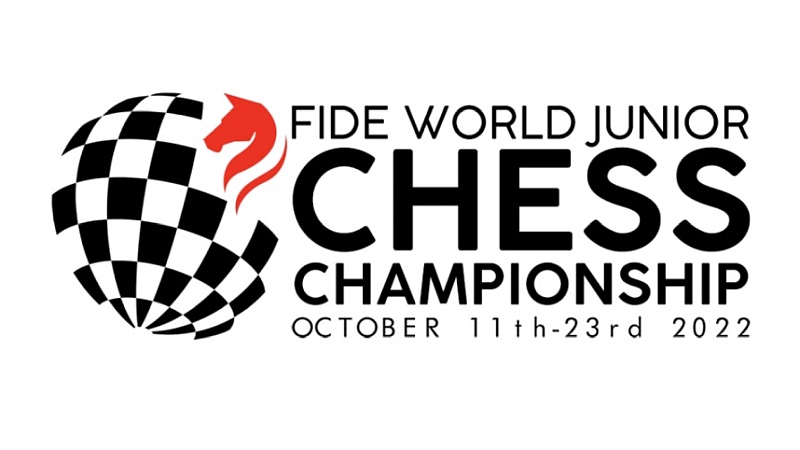
The 2022 edition of the FIDE World Junior Chess Championship in Palmasera Resort in Cala Gonone, Sardinia, crossed the halfway mark. After six rounds of play, the participants enjoy a much-needed day off. The organizers prepared various entertainment events for the players, such as Gulf Tour – a wonderful excursion along the coast of Cala Gonone, and the Jeep Excursion – a more extreme option of going to the mountains. In the open section, as many as thirteen participants were heading in Round 6 with 4/5, but after some clashes on the top boards, the leading group dwindled to just four players tied for first place. Frederik Svane, Nikolozi Kacharava (pictured above), Adam Kozak and Batsuren Dambasuren scored important victories and now share first place. A large group that includes the rating-favourite Andrey Esipenko is trailing by a half-point. Since most of the players at the top have not faced each other yet, we can expect some exciting battles at the final stretch. Top 10 after Round 6: 1 Svane, Frederik GER 2566 5 2 Kacharava, Nikolozi GEO 2512 5 3 Kozak, Adam HUN 2516 5 4 Batsuren, Dambasuren MGL 2522 5 5 Gadimbayli, Abdulla AZE 2499 4½ 6 Isik, Alparslan TUR 2377 4½ 7 Esipenko, Andrey FID 2668 4½ 8 Sonis, Francesco ITA 2531 4½ 9 Ivic, Velimir SRB 2553 4½ 10 Horvath, Dominik AUT 2505 4½ The girls section has also been a close affair, with Govhar Beydullayeva leading the field sitting on 5.5/6, just a half-point ahead of Meruert Kamalidenova, Nurgyul Salimova, and Assel Serikbay tied for second place. With five rounds to go, this tournament seems wide open as well. An unfortunate incident occurred towards the end of Round 6. During a routine check, one of the players, Priyanka Nutakki, was found to have a pair of earbuds in her jacket pocket. While there is no indication of foul play on her part, earbuds are strictly forbidden at the playing hall. Carrying these devices during a game is a violation of fair play policies, and it is penalized with the loss of the game and expulsion from the tournament. The point scored by Nutakki in Round 6 has been awarded to her rival, Govhar Beydullayeva. The Indian delegation filed an appeal, but the Appeals Committee reconfirmed the decision. Top 10 after Round 6: 1 Beydullayeva Govhar AZE 2356 5½ 2 Kamalidenova Meruert KAZ 2376 5 3 Salimova Nurgyul BUL 2415 5 4 Serikbay Assel KAZ 2181 5 5 Urh Zala SLO 2221 4½ 6 Schneider Jana GER 2331 4½ 7 Kurmangaliyeva Liya KAZ 2199 4½ 8 Hrebenshchykova Yelyzaveta UKR 2268 4 9 Ouellet Maili-Jade CAN 2177 4 10 Schulze Lara GER 2266 4 Photo: Przemek Nikiel Official website: fideworldjunior2022.com
Intercontinental Championship for Prisoners: Serbia wins youth event
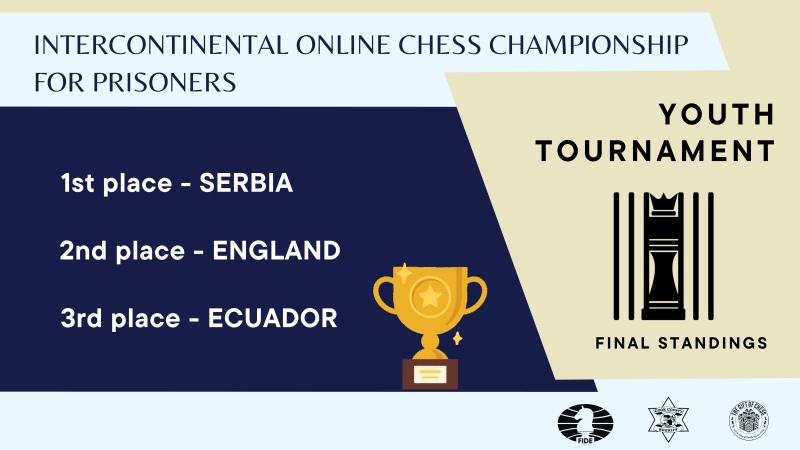
Teams that will play the final matches of the second Intercontinental Online Chess Championship for Prisoners – the biggest-ever chess event among correctional facilities – were determined today. The event organized by FIDE and the Cook County (Chicago, IL, USA) Sheriff’s Office started on October 13, the International Day of Education in Prison. The teams of the Philippines and Colombia will battle it out for the gold in the men’s section of the championship. Both teams topped their groups in the championship stage today. India 1 and El Salvador came second in their groups and will fight for the bronze medal. In the women’s event, Mongolia and Serbia advanced to the final. Unfortunately, the semifinal between Mongolia and England was not held due to technical difficulties on the latter’s side. Mongolia reached the final, where they will face Serbia, who beat Trinidad & Tobago in the semifinal. In the youth section, team Serbia became the winner of the Second Intercontinental Online Chess Championship for Prisoners after defeating England in the final. The bronze medal goes to the Ecuador team. The winners were greeted by the FIDE President Arkady Dvorkovich: “My applauses to team Serbia who won gold in the youth competition. We held it for the first time, as we didn’t have a separate junior event last year. I think this is a great achievement for the team. You represented your country and yourselves; you showed great talent and effort to win this tournament. But the most important thing is that you started loving chess, having fun from the game. For me personally, it is important that while you are entering your adult lives, you have a chance to improve. Probably, you’ve made some mistakes in your past, but you have all the opportunities to be better in the future. And chess will certainly help you with this.” Like a day ago, the broadcast of the event was visited by many guests – chess promoters, organizers of tournaments and chess classes in prisons, and chess enthusiasts promoting the game among at-risk communities. Spanish lecturer, presenter, commentator, journalist and chess promoter Leonxto Garcia talked about three main reasons why chess is working so well in prisons: “The first one is that every hour inside a prison gets much faster. Time goes faster when we are playing chess. The second idea is that chess makes us think about the consequences of what we are going to do before doing it. And third, chess is a very good way to take out our tendency to violence. Every human being has some tendency to violence – bigger or smaller. Chess is a war with no blood. It is a way to take out that violence. Those three reasons are perfectly appliable and valid to any person and normal citizen who lives outside prison.” Mikhail Korenman, Manager of the Chess Programme at Cook County Sheriff’s Organization, Member of FIDE Social Commission, is one of the driving forces of the Chess for Freedom programme. He started teaching chess in a Chicago jail more than ten years ago. He talked about the Chess in Jail program in Chicago prison and the importance of hosting inter-jail tournaments for prisoners. “Why do I feel this event is important? Chess gives everyone an equal opportunity to win. I can do it. I can do it myself, and I can be the winner. This is important. Chess teaches a different way of thinking. You need to think for yourself and for your opponent. I always tell my students: “Guys, think for your opponent before you make your decision!” That is very important. And they need to apply it to their everyday life. It’s not only you making decisions. It’s also about seeing what your opponent is doing,” he said. Deputy Chair of the FIDE Management Board Dana Reizniece-Ozola not just supervise FIDE’s social initiatives, including the Chess for Freedom programme. During the Intercontinental Chess Championship among Prisoners, she was a coach of team Latvia. “This experience is very special not only for the inmates themselves but for those who spend their lives, energy and time trying to find ways how to re-socialize inmates, to give them a second chance, to encourage them to do more. FIDE does not only organize this tournament; we are trying to analyze and get feedback so that to see if there’s any positive impact of chess in prisons on inmates. We’ve already made the initial analysis with the help of the Armenian Chess Institute. This year we also made a survey to be able to measure the results. This is important for decision-makers – politicians, officials, and sponsors,” she said. Medalists of the championship will get chess sets from one of the partners of the event – a nonprofit organization, “The Gift of Chess”, which distributes chess sets and training technology across the four key initiatives (educational, prison, global, and elderly outreach). Its founder Russell Makofsky visited the players from the Cook Country jail and shared his impressions about his visit. “Chess is a low-cost catalyst for a change. Introducing chess to a community changes the dynamics of that community in many ways. The more I understand the power of chess, the better I can see the application of it in the prison system. A single chessboard can change the whole environment. It helps with strategy, planning and critical thinking, it develops soft skills, but it also connects people to a shared idea. Here in the Cook County Jail, I see people of all ages, races and backgrounds celebrate with each other this idea that they are a chess team, they can do something together, and be good at it.” The final matches in men’s and women’s sections of the second Intercontinental Online Chess Championship for Prisoners will be held on Monday, October 17, and will be broadcast live on the FIDE Youtube channel.
Prisoners from 46 countries take part in the Intercontinental Championship
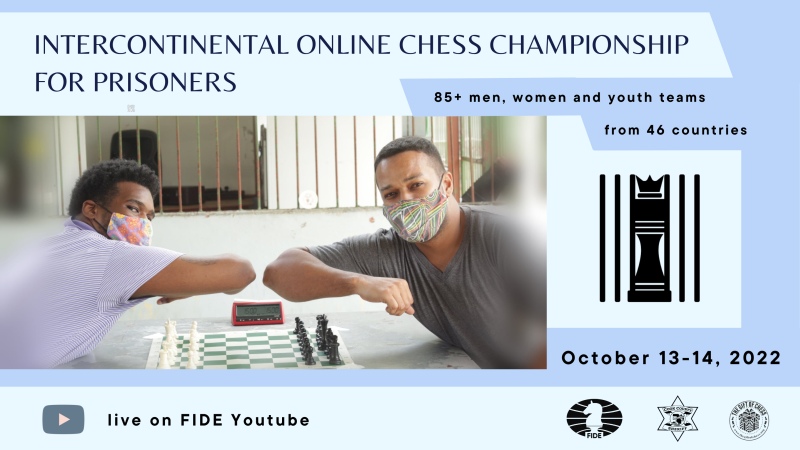
The second Intercontinental Online Chess Championship for Prisoners – the biggest-ever chess event among correctional facilities – kicked off on October 13. 85+ teams from 46 countries representing all continents joined the tournament, which aims to popularize chess as an efficient tool for reintegrating incarcerated people. The online opening ceremony featured FIDE President Arkady Dvorkovich, Cook County Sheriff Tomas J. Dart. and Deputy Chair of the FIDE Management Board Dana Reizniece-Ozola. FIDE President Arkady Dvorkovich greeted the participants of the event. “Our project “Chess for Freedom”, is for people who made mistakes in their lives before but have a chance to improve. FIDE is going to bring chess to all corners of the world, especially to those corners where chess can transform lives of people, give them a chance to live a better life and change things around. People who are not free now can develop their lives to the best. I hope this event will give a boost to the development of chess around the world and will have a great social impact,” he said. Cook County Sheriff Thomas J. Dart, who introduced the chess program to Cook County Jail more than 10 years ago, emphasized that chess teaches its players valuable life lessons: “Chess is an amazing sport; it gives you critical skills, but it also teaches you patience, things that we can all learn from and something we can all use in our daily life. I hope you can enjoy the game today, and good luck, everyone.” Along with Cook County Sheriff Thomas J. Dart, representatives of the consulates of Australia, Brazil, Bulgaria, Colombia, Czech Republic, Ecuador and Mongolia visited Cook County Jail to greet the participants of the championship and take part in the round table dedicated to Chess in Prisons initiatives. Today, in the group stage, the teams, comprised of 4 players with an unlimited number of substitutes, were divided into groups and competed in round-robin tournaments. The top two teams from each group advanced to the Championship round, which will be held tomorrow, October 14. Those teams are Mongolia 1 and India 1 (Group 1), Serbia 1 and Bosnia and Herzegovina (Group 2), Georgia and Bulgaria 2 (Group 3), Zimbabwe and England 2 (Group 4), UAE and the Philippines 2 (Group 5), USA – Chicago and Colombia (Group 6), El Salvador and Argentina 3 (Group 7), and USA – Kansas and Argentina 4 (Group 8). For the first time, separate tournaments are organized for women’s and youth teams. In the youth tournament, Serbia and England (Group 1), and Ecuador and Argentina 1 (Group 2) has qualified for the Championship Round tomorrow. In the women’s event, semi-finalists are Mongolia and Serbia (Group 1) and Trinidad & Tobago and England (Group 2). The championship, organized by FIDE and the Cook County Sheriff’s Office (Chicago, IL, USA) and hosted by Chess.com, is live-streamed on FIDE’s Youtube channel. Apart from the tournament itself, the broadcast includes professional commentary and interviews with special guests – FIDE officials, government officers, members of the penitentiary administration and policymakers sharing the best practices of introducing chess to inmates, as well as former convicts proving from their own experience the positive impact of the game on prisoners. Deputy Chair of the FIDE Management Board Dana Reizniece-Ozola joined the broadcast to talk about FIDE’s social initiatives, the Chess for Freedom programme, and more. That is how she explains the rapid growth of the event: “The prison officials see that in the places where the chess programme is implemented the behaviour of the inmates change, the depression and stress levels decrease, they are better in resocializing when they leave prisons. It’s not only about the skills and another way of spending your free time, it is also the sense of belonging to a community, to the chess family. We’ve been working a lot to advocate for a programme itself, but I think that the example of the other countries works even better than our invitations.” Indeed, chess programs in prisons are now implemented in many countries around the world and bring benefits to inmates introduced to the game. Simosakhe Ngwane is an ex-convict from Molweni, South Africa. He didn’t even know about the game of chess before it was introduced to him in prison. And now, he organizes chess classes for at-risk kids in his hometown. “After I’ve met chess I realized that life is made up of clear steps that you need to know, to understand, and to respect. I’ve learned a lot of life principles I couldn’t have learned without meeting chess. It gave me patience. If all the kids outside learned how to play chess in school, maybe most of them would know how to live without crime, without offending other people. Because chess is something very simple – you just need to know other people and yourself. The simple rule “touch is a move” gives discipline. And disciplined thinking gives disciplined behaviour,” he said in his interview. The event will continue tomorrow, October 14, with the Championship round, where 16 top teams of the men’s event, divided into two groups, will play round-robin tournaments with the winners facing off in the championship match. The four best women’s and youth teams will play knock-out matches. The broadcast will start at 10:00 a.m. CET. More information about the championship and Chess for Freedom programme is here: https://chessforfreedom.fide.com/
Arkady Dvorkovich meets with President of Argentina
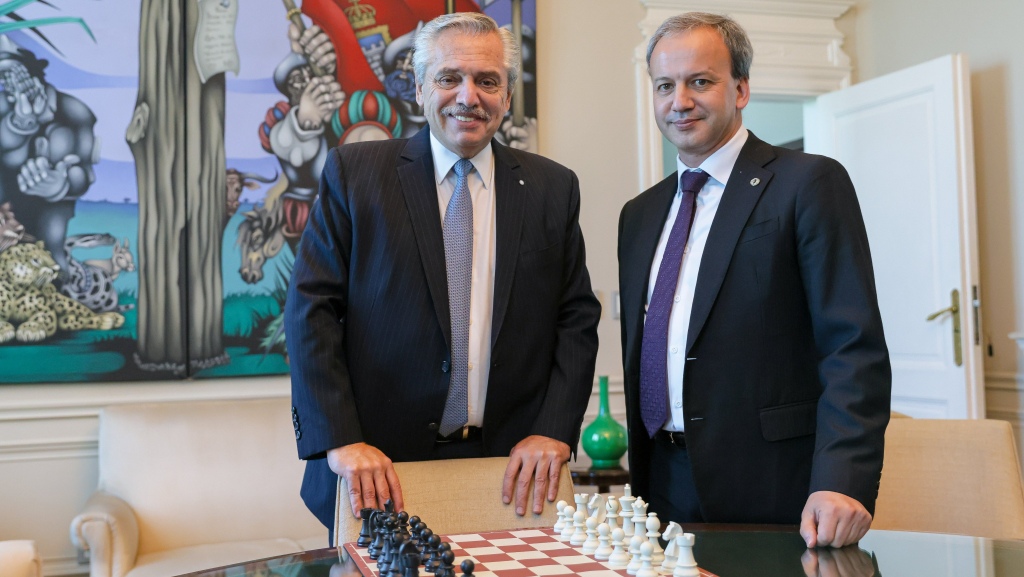
On October 12, 2022, the FIDE President Arkady Dvorkovich was received by the President of Argentina, Alberto Fernández. During the meeting, they discussed how to promote chess in schools and youth chess. The meeting with the President was part of the program dedicated to the celebration of the 100th anniversary of the Argentinian Chess Federation, one of the founder members of FIDE. Alberto Fernandez vehemently expressed his full support for chess. One of the possibilities that were discussed was the opportunity to hold Chess Olympiad in South America in 2028, to mark the 50th anniversary of the Buenos Aires Chess Olympiad in 1978. The FIDE president also met with Gabriel Lerner, Secretary of State for Youth, Family, and Social Development. They discussed the multiple applications of chess as a social tool, giving some best-practice examples for chess in prisons, for seniors, et cetera. Another important meeting took place with Conrado Carrasco Quintana, a representative of the Ministry of Sports and the person responsible for the sports federations in Argentina. The organisation of chess competitions of different levels was the main topic of discussion. Arkady Dvorkovich also met with Daniel Osvaldo Scioli, one of the most influential political figures in Argentina. Current Minister of Productive Development, Scioli is a former Governor of the Buenos Aires province, Argentina’s vice-president, and President of the Senate. Apart from his career as a politician and as a businessman, Scioli has been a prominent sportsperson who competed in swimming, tennis, basketball, and then offshore powerboat racing, a discipline in which he won many titles. Of course, such a competitive person also loves chess! Naturally, the FIDE president also visited the “Pro-Am International Chess Tournament” held to commemorate the 100th anniversary of the Argentinian Chess Federation. With a total of 173 players and 20 Grandmasters, this is the strongest tournament held in Argentina since the World Championship in San Luis in 2005.

